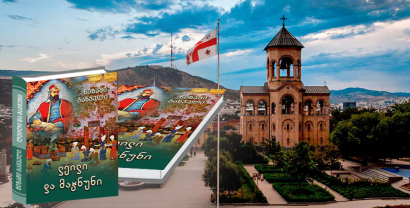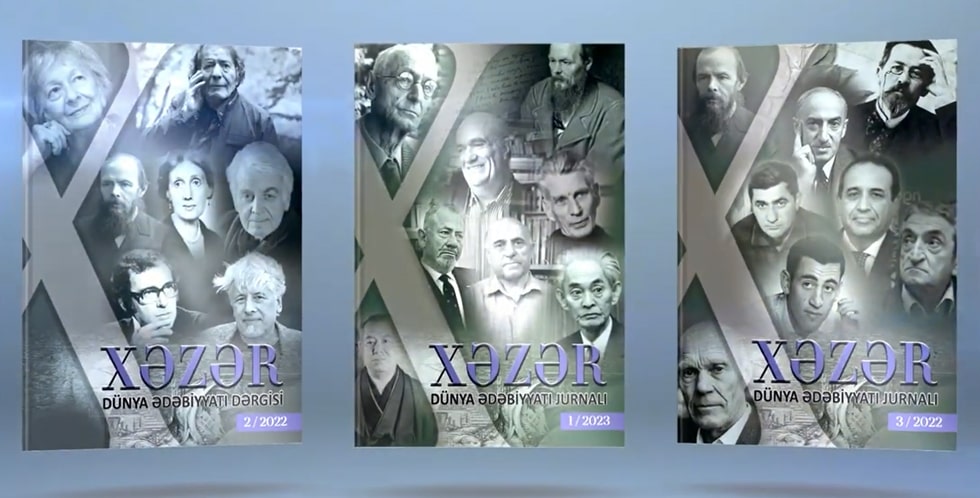
The Azerbaijan State Translation Centre (AzSTC) is pleased to announce the printed edition of Leyli and Majnun by Azerbaijan’s greatest poet Nizami Ganjavi due to the announcement of 2021 as a “Year of Nizami Ganjavi” in Azerbaijan.
The epic love poem was published in Georgian by the Tbilisi-based publishing house “İverioni”. The translator of the poem is Professor Magali Todua, a notable Georgian orientalist and translator. Khalil Yusifli penned the foreword to the book edited by writer-translator Imir Mammadli.
Foreword
A model for the inaccessibility of human genius
Outstanding Azerbaijani poet and thinker Nizami Ganjavi, whose reputation rests on his great Khamsa (“The Quintuplet”), is one of the greatest geniuses in world literature. Each theme and event in his poetry can be seen through the prism of his soul thus gaining a deep social and philosophical value.
The great master of the word, taking advantage of the possibilities of the theme, expressed his reflection of confusion on life, people, their morals, rights and actions. In this poem, Nizami repeatedly touches on the problem of humanity and time, as well as its various aspects, exposes the vices of his times, and encourages people to do good and multiply perfect things.
Nizami's poem confirms the idea that sooner or later man will be able to humanize the world, to change the imperative of the time and its identity, even at the cost of sacrifices and tragedies. The poet believes that nature and life have their own dialectic, anything dark will enlighten over time and all the bad will change for the better.
This dialectical thinking reflects Nizami's deep belief in man's victory over time, that nothing in the world is eternal, including power, and those who are victims of tragedy today will find a happy future. Leyli and Majnun is an incomparable poetic ocean consisting of Nizami's thinking on man and time. The story of unhappy love is not the poem’s main idea. Perhaps it is necessary to accept it as the greatest artistic and philosophical work about the human and the universe affected by this theme. There may be a question about the connection of the themes with Nizami's poem, but when we carefully read the work, we can conclude that the deep thinking is directly related to the main theme of the poem. The poet, both at the beginning and throughout the poem, in its various parts as a bridge with the previous themes of the link, in a peculiar manner, tells about life and creation, about contemporaries and their desires, about their conception of life and actions.
Nizami paints a character of the dedicated and selfless, humane Majnun, full of sublime love, whose courage and determination contribute to overcoming the "obstacles on his way to enlightenment."
Leyli's image depicts the awakening of a woman in the Middle Ages, in the context of awareness of her humanity and tragedy. Leyli's tragedy lies in the reluctance of the old to give way to the new, in the intransigence and cruelty of all the old to everything new. In the Middle Ages, when the absolute power of feudal lords began to fluctuate, but still retained its power, the tragedy of Leyli seemed something ordinary. Outwardly, Leyli resembles a person who obeys the demands of her time, yet she challenges time with her proud silence and as if the sun illuminates the darkness, continuing to live as a person carrying the torch of humanity.
The characters created by Nizami in this poem, described and analyzed events that convey the basic essence, in their diversity create an image of a high-moral person, which reflects the thinking, morality and values of that era. The greatest thinker speaks of the value of each of the elements, fulfilling its role in the structure of the entire poem, conveying the importance of each episodic character, which is characterized by an ideological component, which serves to better describe the characters of that period. Like every work of the poet, this poem is a valuable treasure.
Professor Khalil Yusifli,
Doctor of Philological Sciences

 Book “Fuzuli’s Creativity” by Mir Jalal Out in Jordan
Book “Fuzuli’s Creativity” by Mir Jalal Out in Jordan
 Yusif Vazir Chamanzaminli’s Creativity in the Israeli Literary Magazine
Yusif Vazir Chamanzaminli’s Creativity in the Israeli Literary Magazine









